Tominosuke Hayama
Nascimento : 1889-07-31, Kyoto, Kyoto Prefecture, Japan

Based on the original work by Shuji Hojo, Itohan Monogatari depicts the fate of a clumsy and kind-hearted woman in the Taisho era.

Tomu Uchida's Gyakushu Gokumon Toride is a masterpiece which treats class struggle in the end of Samurai era(it's a fiction). The story is based on the legend of William Tell, changed at the end of age of Samurai.

Film adaption by Kenji Misumi

Early film by Kenji Misumi.
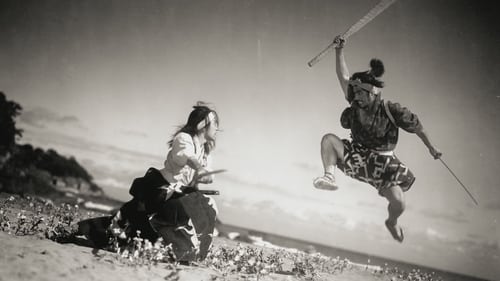
(uncredited)
Neste terceiro filme da Trilogia do Samurai de Hiroshi Inagaki (baseado no livro "Musashi" de Eiji Yoshikawa), Musashi (Toshirô Mifune) é desafiado pelo confiante e habilidoso Sasaki Kojiro (Koji Tsuruta), com o qual duelará dentro de um ano. Neste período decide viver nos arredores de uma vila cultivando legumes, enquanto ainda é perseguido por Otsu (Kaoru Yachigusa) e Akemi (Mariko Okada), ambas apaixonadas por ele. Conforme a data do duelo se aproxima, Musashi é forçado a tomar uma decisão que concilie ou não seus sentimentos por Otsu e sua paixão pelo caminho do guerreiro, ao mesmo tempo que se prepara para o maior desafio de sua vida.

A mysterious black hooded man intervenes when an anti-government group who plots to steal the precious blue diamond called “Maguna no Hitomi.”
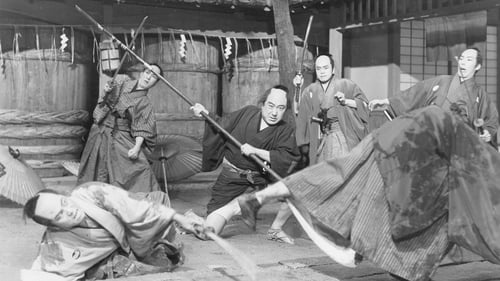
No final do século XVIII, um jovem samurai beberrão viaja com seus dois servos pela estrada de Tokaido, rumo a Edo (atual Tóquio). Ao longo do caminho, são acompanhados por todo tipo de pessoas que fazem o mesmo trajeto: andarilhos, vendedores, artistas, camponeses, um menino órfão e também, segundo as autoridades, um ladrão de identidade desconhecida.
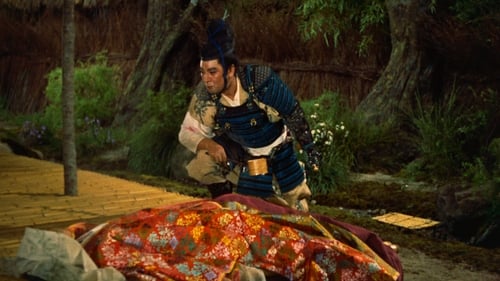
Peddler
Em 1159, durante uma tentativa de golpe contra a realeza, arma-se um plano para que a família real possa fugir. Uma senhora da corte aproveita a situação e se faz passar de esposa de um Lorde para sair da cidade. Ela conta com a ajuda de um samurai, que a escolta com segurança. Mais tarde, o samurai pede ao Lorde como recompensa a mão desta mulher em casamento. Mas ele descobre que ela já é casada. O samurai não irá desistir e chegará a desafiar o marido de sua amada para que a deixe, o que irá gerar trágicas consequências.

1953 Hiroshi Inagaki movie.

A woman loses her son through an evil conspiracy and commits suicide. Shortly afterwards a ghost cat begins haunting the conspirators. This is Takako Irie's first bakeneko (ghost cat) movie; it started a Daiei cycle which was very popular at the time in Japan.

Gotō Matabei is the most able and fierce samurai of the Kuroda clan. However, he gradually dislikes the ruthless personality of Kuroda Nagamasa and leaves the clan. Seven years later, he joins Toyotomi Hideyori's army. Filmed in 1945 and released in 1952.

Shimazu Shigehide

The Forgotten Children

Jewel thieves become interested in an invisibility formula invented by Professor Nakazato and want to use his invention to acquire a diamond necklace called the "Tears of Amour."
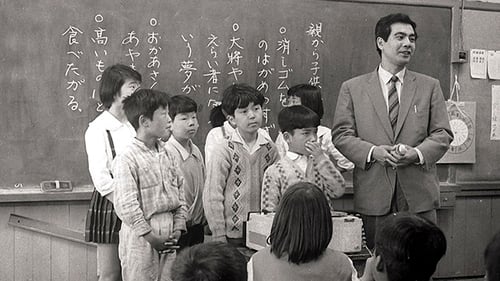
A small-town boy with a learning disability attempts to fit in with his classmates.

A 1946 Japanese film directed by Keigo Kimura.

Matsugoro is a poor rickshaw driver whose animated spirit and optimistic demeanor make him a favorite of the town. Matsu helps an injured boy, Toshio, and is hired by the boy's parents.

Kobei
Ito Daisuke's wartime retelling of the Miyamoto Musashi story.

Shimakami Fujisawa
It is a historical drama that follows Katsu Kaishu's efforts to surrender Edo Castle bloodlessly in the first year of the Meiji period.
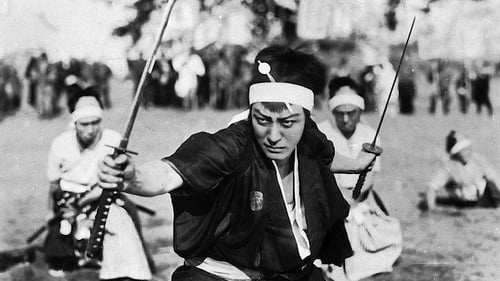
The tale of Nakayama Yasubei’s duel is famous, even if he in reality probably did not cut down 18 opponents. The story has been related in film, rakugo, kodan and on stage many times, in part because Nakayama later joined the famous 47 Ronin (Chushingura) as Horibe Yasubei. But Makino and Inagaki’s version gives no hint of this more serious future, playing up the thrills and the comedy with Bando’s bravura performance. The multiple pans of Yasubei running to the duel are an exemplar of the experimental flourishes of 1930s Japanese cinema and the final duel, performed virtually like a dance number, is a marker of Makino’s love of rhythm and one of the best sword fights in Japanese film history. The film was originally released under the title Chikemuri Takadanoba (Bloody Takadanobaba) with a length of 57 minutes, but suffered some cuts and a title change when it was re-released in 1952.

Prewar jidaigeki starring Denjiro Okochi











